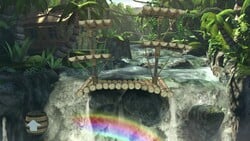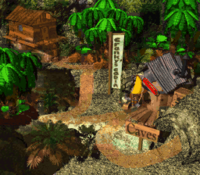Kongo Falls
| Kongo Jungle (Kongo Falls in Ultimate) | |
|---|---|
 Kongo Falls in Super Smash Bros. Ultimate. 
| |
| Universe | Donkey Kong |
| Appears in | Melee Ultimate |
| Availability | Starter |
| Tracks available | In Melee: Kongo Jungle |
| Article on Donkey Kong Wiki | Kongo Jungle |
| “ | Face off against your foes atop a raft stuck at the edge of a waterfall. How well you utilize the rock jutting out at the bottom right can be the difference between victory or defeat! | ” |
| —Super Smash Blog, Super Smash Bros. Ultimate Official Site | ||
Kongo Jungle (コンゴジャングル, Kongo Jungle) is one of three Donkey Kong stages in Super Smash Bros. Melee. This stage is played in All-Star Mode when the player faces Donkey Kong and any of his teammates. This stage is also set to return in Super Smash Bros. Ultimate under the name Kongo Falls (いかだと滝, Raft and Waterfall).
Stage layout
The main fighting area of the stage is a raft stuck on the edge of a waterfall. The raft's bottom is fairly flat but has gentle curves that change as combatants run and jump on it. On either side is a vertical post with two platforms attached to the middle and top of each one. The posts themselves are always perpendicular to the raft, so when the raft moves a little, the post can change its position and thus change both platform angles on the posts. There is also a rock on which a character can stand on. It protrudes from the waterfall's edge on the right side.
Below the raft is a spinning barrel moving back and forth. If a player's fighter gets caught in it, the player can push any button to launch out his or her fighter, who gets launched in the direction the barrel's arrow faces. The barrel also fires out fighters who are in it for too long. The arrow sometimes stops while pointing to the bottom. Characters can get caught in it for too long, causing them to be eventually fired downward and KOed. The barrel occasionally stops and spins in place.
This stage also features a Donkey Kong series enemy, Klap Trap. If a character touches one, he or she flies off to death at middle to high percentage (unless shielded or air dodged). Klap Traps occasionally get caught in the barrel cannon. They still KO the player if he or she touches them. Finally, there are logs that occasionally roll down the waterfall and stop before collapsing momentarily. They give characters a narrow platform to escape to for a few seconds before plummeting to the bottom of the waterfall.
When stage hazards are turned off in Ultimate, the barrel and Klaptrap are removed. In addition, the raft remains completely still when stood on.
When the player fights Donkey Kong in The Great Maze, the stage resembles Kongo Jungle (except the colors and background are different).
Tournament legality
Kongo Jungle is usually banned in tournaments, primarily because the rock at the right of the screen creates an overabundance of camping. Klap Traps are also considered to be too dangerous and powerful for a stage hazard.
Origin
This stage originates from Donkey Kong Country. Donkey Kong lives in a treehouse, which appears in one of the world maps and the first level. The cabin in this stage's foreground resembles Donkey Kong's treehouse.
The game also features barrels which the player can fire out of. They move either up and down, left and right, or diagonally. There are also stationary barrels which rotate around.
In Donkey Kong Country 2: Diddy's Kong Quest there are arrow barrels that fire at whichever direction it points at. This stage features an arrow barrel, but it moves horizontally while rotating.
Klap Traps are a common enemy in Donkey Kong Country, oftentimes blue and sometimes purple; they crawl around and clamp their jaws. A few appear in this stage as a hazard, where they head down the river and snap their jaws at fighters. [1]
King of the Rock
King of the Rock is a gameplay method in Super Smash Bros. Melee which can be considered as a Special Melee but must be set up manually. This mode features no specific data within the game, but its gameplay is explained in the instruction booklet. It is only possible with human players, as there are no CPU commands to cooperate with this type of Melee.
How to play
The suggested way to play King of the Rock is to first set up a 1-minute Melee on this stage and then position every player on the rock platform at the bottom-right. Every players' objective is to fend opponents away from the rock. Anybody who stands on the rock platform when the time limit runs out wins. It is fairly low and small, meaning it can be tricky to land on.
| “ | Play a MELEE on the KONGO JUNGLE stage and set the time to one minute. Position all players on the rock on the right side of the stage, then fight for control of the rock. The player in control when the time runs out wins the match. | ” |
| —Melee instruction manual | ||
Gallery
Meta Knight and Toon Link ready to battle.
Donkey Kong on the stage.
Popo attacking.
Trivia
- Kongo Jungle is notable for being the first stage in the Super Smash Bros. series to have fully vocalized music for its background music.
- The platforms sway from side to side a tiny bit. The only effect it has on players is that it could be slightly harder to land on them.
- Crates and logs float down the river. The latter gets stuck in the water unlike the former. Logs stick on either the left or right side of the stage. The stage's crates do not contain any items.
- Every once in a while, a Klap Trap which gets stuck in the barrel will be shot on to the stage, dealing 30% damage and often KOing every fighter in the center of the stage. However, it can be Countered.
- Kongo Jungle is the only Past Stage to have its Japanese and English names changed between games. The only other that had a change is Congo Jungle, but it only had a typography correction to "Kongo Jungle" in Melee and Super Smash Bros. for Wii U, and only in the English versions.
| Stages in Super Smash Bros. Melee | |
|---|---|
| Starter stages | Brinstar · Corneria · Fountain of Dreams · Great Bay · Green Greens · Icicle Mountain · Jungle Japes · Kongo Jungle · Mushroom Kingdom · Mute City · Onett · Pokémon Stadium · Princess Peach's Castle · Rainbow Cruise · Temple · Venom · Yoshi's Island · Yoshi's Story |
| Unlockable stages | Battlefield · Big Blue · Brinstar Depths · Final Destination · Flat Zone · Fourside · Mushroom Kingdom II · Poké Floats |
| Dream Land · Kongo Jungle · Yoshi's Island | |
|
| |
|---|---|
| Fighters | Donkey Kong (SSB · SSBM · SSBB · SSB4 · SSBU) · Diddy Kong (SSBB · SSB4 · SSBU) · King K. Rool (SSBU) |
| Assist Trophy | Klaptrap |
| Boss | Giant Donkey Kong |
| Stages | Kongo Jungle · Kongo Falls · Jungle Japes · Rumble Falls · 75m · Jungle Hijinxs |
| Items | Hammer · Barrel Cannon · Peanut · Spring |
| Enemies | Kritter · Tiki Buzz |
| Other | Dixie Kong · DK Barrel · DK Island · Pauline · Zinger |
| Trophies, Stickers and Spirits | Trophies (SSBM · SSBB · SSB4) · Stickers · Spirits |
| Music | Brawl · SSB4 · Ultimate |
| Masterpiece | Donkey Kong |
| Related universe | Mario |





